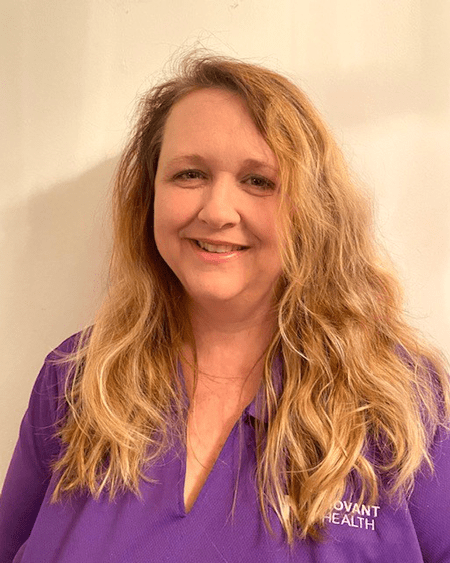Holistic Transformations.
Community health workers are providing remarkable care by facilitating solutions to the social determinants of health.

Meet remarkable team member Donna Greene
Donna Greene has spent 23 years helping community members in Salisbury, North Carolina. She was born and raised there. And from a young age, Greene appreciated the community. She made it her mission to serve the people in it.
Early in her career, she worked as a social work case manager and HIV case manager. When she saw the job description for community health workers (CHWs) at Novant Health Rowan Medical Center, she couldn’t help but apply. Greene was ready for a change. She hoped to get to know her patients’ needs and help them overcome personal and health challenges.
“When I saw the description, I thought, ‘Oh my goodness, this sounds like a summation of everything I have loved about each job I’ve had in my career,’” Greene said. “The difference is that you are able to see the arc of where the client started and how far they can come in just a few months. It’s so rewarding.”
Community health workers like Greene have the opportunity to bridge the gaps of knowledge and access for people in the community who need healthcare solutions. They guide patients through a 90-day program with an end goal of personal agency. CHWs help clients enroll in Medicaid if they are eligible, solve transportation challenges and develop the tools they need to manage their healthcare needs effectively.
A day in the life of a CHW
Doctors bring in community health workers when they see a patient with a high frequency of emergency room visits or hospitalizations over a period of time. A patient may have voiced concerns over experiencing social determinants of health, a broad term for the conditions in the environments in which people are born, live, learn, work, play and worship that affect health and quality of life. They can include not having transportation, not having a primary care doctor or not having means for food or medicines. Once they’ve been called in, CHWs go to a client’s hospital room or home and begin the process of discussing and facilitating solutions. Clients are usually in a situation that can be helped, but no one has ever intervened.
“When you visit a client’s home, the different reasons why people struggle with accessibility to care become clear,” Greene said. “Sometimes they’re living on a dirt floor with no running water. It looks like you’re not even living in this century. You understand how healthcare or insurance isn’t a priority when someone barely has access to the basics.”
After getting to know a client, CHWs introduce a 90-day program. They provide hands-on guidance through the first six weeks. Then, they see how the client fairs on their own for the last six weeks. CHWs check in on clients every two weeks during the second half of the program. Greene notes that she makes sure her clients know she is available to help if they are struggling at any point.
“They’re so appreciative. Sometimes they just need a friend to show them care and validate what they are going through. Many of my clients are completely open and honest. That helps me help them,” Greene said.
The impact
When a client is willing to do the work alongside a CHW, the impact is remarkable.
Greene explains working with a man who couldn’t read or write but had never told his doctors, creating a significant barrier to care. He was uncomfortable making appointments and didn’t understand his healthcare paperwork. With Greene’s assistance over the past couple of years, he has transformed.
“He makes every appointment. He follows up, asks questions and is honest about his situation. It brings me so much hope to see how CHWs can help guide these transformations,” she said.
Last year, Greene led a clinical rotation for residents from Campbell University. She believes a rotation with community health workers should be in every medical school curriculum. Understanding the social needs of patients and being able to provide guidance about resources can make a huge impact, especially in the hospitals that do not have CHWs on staff.
“The best quality care is when doctors, nurses and CHWs know what we can do to make our patients’ lives safer and healthier. CHWs are able to share resources and programs with patients. In many cases, it changes their entire life,” she said.
Greene loves her job. She sees the need for community health workers and believes she was put on earth to be one.
“It’s the best job. I’ll be 90-years-old and still trying to work part-time,” Greene said. “I’ve never woken up and thought, ‘I don’t want to go to work.’ I’ll never take that for granted.”
Your gift supports remarkable care.
You can support the work community health workers do for community members in need by making a contribution through Novant Health Rowan Medical Center Foundation. Your generous gift can provide lifesaving care to people who need essential healthcare services.